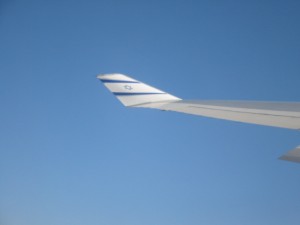
There seems to be a lot of jostling going on in Israel’s airline industry lately. Ideally this will lead to increased competition, which should benefit the consumer, if corruption doesn’t preserve the status quo. But what I find most interesting is the backstory to this long-running dispute.
Let me start by discussing a few of the recent developments. There are two main issues that have been in the news recently regarding Israeli air carriers: domestic flights on the Tel Aviv–Eilat route and aliya (immigration) flights.
The main carriers who had been serving the Ben Gurion (Tel Aviv) to Eilat route are Arkia and Israir. But back in August, El Al received permission from the Ministry of Transportation to begin flights. As the big dogs on the block, they can easily hurt Arkia and Israir’s business, and this route forms a central portion of both the smaller airlines’ businesses. Thus the two filed a petition with the High Court of Justice to prevent the deal. El Al, for its part, says the route would help lower prices for consumers, and also would open more international routes to Eilat.
As proof, on December 15, El Al announced ridiculously cheap fares on Tel Aviv to Eilat flights: 80 NIS one-way. This seems to have been a response to Arkia’s announcement a week earlier offering a temporary sale price of 99 NIS one-way.
Arkia, the more vocal of the two smaller airlines, claims they wouldn’t mind the competition on this route if they would be allowed to compete on a larger scale internationally:
“We aren’t fighting against El Al’s daily flight to Eilat. We are concerned about the ability of Israeli airlines other than El Al to exist,” said Arkia CEO Gad Tepper after the hearing. “Arkia welcomes the competition but would be happy if international routes would open up [for Arkia] first,” Tepper added.
El Al, Tepper says, commands 95% of all air traffic rights in Israel, so for real competition to exist, both national and international air traffic should be considered.
The other recent big news in the Israeli air traffic world was that El Al would no longer maintain its monopoly on aliya flights. El Al felt that the Jewish Agency was not paying enough for each immigrant. (As background, anyone who decides to immigrate to Israel, and is granted citizenship, is entitled to a free one-way flight to Israel.) So they decided to seek an increase of 5% in such fares. Though they later recanted, a rift between the airline and the Agency had already formed.
As of this December 18 story, Arkia received contracts for aliya flights from Munich, Kiev, Tblisi and Paris. Israir got contracts for Rome, Basel, Nice and Moscow. And the Jewish Agency claims it is not ruling out opening U.S. aliya flights to international carriers (no Israeli airline, other than El Al, currently flies a scheduled route to the States).
So Israir and Arkia seem to have chipped away a bit at El Al’s aliya flight pie, even if El Al and the Agency resolve their dispute, as seems to be in the works:
Yet negotiators in both organizations believe the dispute is near its end. “I believe joint work will resume in the coming weeks,” a senior agency official told the Post.
“Both sides have an interest in cooperation. I believe that in a couple weeks or a month, we’ll resolve this,” a senior El Al official agreed.
As I said earlier, however, what makes this story even more interesting is the backstory. While this may seem like a simple big business vs. small business story, or an issue of antitrust vs. government-enforced monopoly, this story also has elements of brother-against-brother familial infighting.
For starters, despite being publicly owned and traded since the early 1980s, El Al is still officially considered the “National Airline of Israel.” Despite privatization, it was given a government-backed monopoly on International traffic into Israel until annual visits reached 10.7 million. After that figure reached 10.1 million in 2007, the government decided to “buy” the rest of the agreement, agreeing to cover a greater share of El Al’s security expenses in exchange for the ability to open up international routes to other carriers.
This was considered a move towards an “Open Skies” policy, that still has yet to materialize in earnest. And even when it was drafted, its efficacy was called into question.
Still, it was following that time that both Arkia and Israir began to gain some scheduled international routes (both had operated some charter operations prior to the legislation shift). Arkia’s first scheduled international routes were to Cyprus and Dublin, Ireland. Israir even succeeded in winning a scheduled flight route to New York’s JFK Airport, and operated it from May 1, 2006 through September 13, 2008. They stopped this route due to economic concerns. Both still fly to many European and Asian destinations.
But while Israir was founded in 1989, and is still privately held, the relationship between El Al and Arkia is much more intertwined. When Arkia was launched as Israel Inland Airlines in 1949, just a year after El Al’s founding, the National Airline owned a 50% share of Arkia, splitting ownership evenly with the Histadrut, Israel’s labor union. They sold off their ownership, until they no longer owned any part of Arkia.
Brothers Izzy and Dedi Borovich had built up a 75% share in Arkia, but in 2006 they were forced to sell their stake in Arkia to the Nakash brothers of Jordache jeans fame. (The other 25% is owned by the airline’s employees.) Why? Because the Borovich brothers had also gained a controlling stake in, you guessed it… El Al!
All this really makes me wonder how much of this bigger story is motivated by pure business interests and how much by some deeper emotional need growing out of these two companies’ long and intertwined histories. And most importantly, will the government continue to protect El Al, as it seems to have largely done for a long time, or will it take the consumer’s needs to heart as well?
What do you think? Let me know in the comments!
